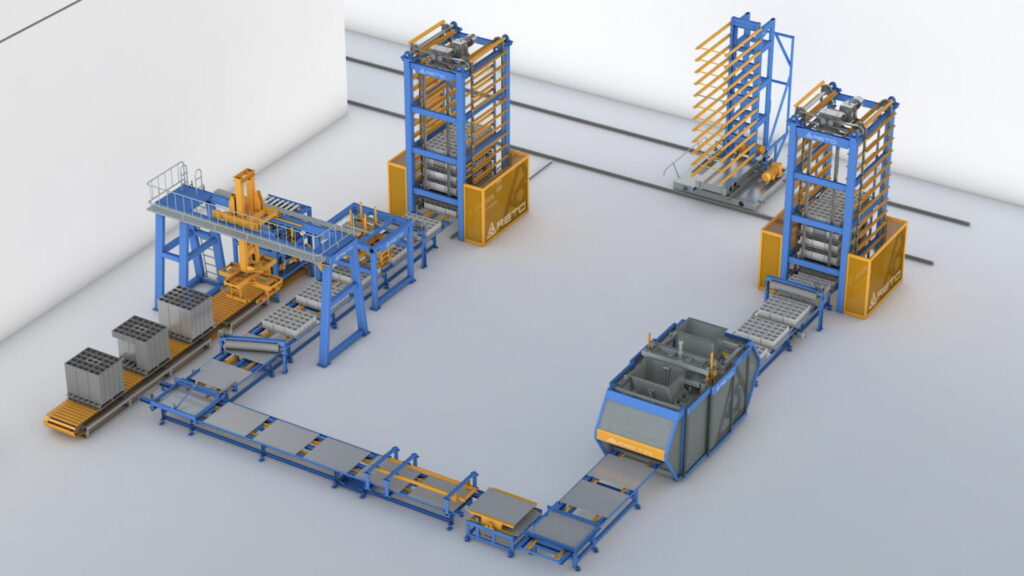В сфере строительства, Спрос на эффективные и экономичные строительные материалы имеет первостепенное значение.. Бетонные блоки стали универсальным решением., предлагая долговечность, сила, и простота конструкции. Но то, что стоит за производством этих важных компонентов здания?
Введите машину для изготовления бетонного блока, Революционная часть оборудования, которая изменила строительную отрасль. В этом посте, Мы рассмотрим функции, преимущества, и влияние машин изготовления бетонных блоков.
Раздел 1: Понимание машин изготовления бетонных блоков
Машина изготовления бетонного блока - это надежное и автоматизированное устройство, предназначенное для производства бетонных блоков различных размеров, формы, и текстуры. Эти машины произвели революцию в процессе производства бетонных блоков, оптимизируя производство и повышая эффективность. Вот несколько ключевых функций и компонентов этих машин:
- Система смешивания и партии: Машины изготовления бетонных блоков оснащены интегрированной системой смешивания и партии. Эта система обеспечивает точную долю сырья, такого как цемент, агрегаты, и вода, приводя к постоянному качеству блоков.
- Блок формовой блок: Сердцем машины является блок формования, которая образует бетонную смесь в желаемые формы блоков. Этот блок может быть настроен для производства различных типов блоков, в том числе твердые блоки, пустотелые блоки, блокирующие блоки, и морить камни.
- Механизм вибрации и уплотнения: Машины изготовления бетонных блоков включают вибрирующие и уплотнительные механизмы, которые оказывают давление на блок -формы, Обеспечение правильного уплотнения и консолидации бетонной смеси. Это приводит к более сильным и более прочным блокам.
- Системы отверждения и сушки: После того, как блоки формируются, Машина обеспечивает системы отверждения и сушки, чтобы облегчить правильное отверждение блоков. Это обеспечивает развитие оптимальной прочности и предотвращает растрескивание или деформацию.
Раздел 2: Преимущества машин для производства бетонных блоков
Внедрение машин изготовления бетонных блоков предлагает многочисленные преимущества для строительной отрасли. Вот некоторые примечательные преимущества:
- Повышенная производительность: Бетонные блок -машины значительно повышают производительность за счет автоматизации производственного процесса. Эти машины могут производить блоки гораздо быстрее по сравнению с традиционными ручными методами, позволяя эффективному завершению строительных проектов.
- Экономическая эффективность: Автоматизируя производственный процесс, Бетонные блок -машины снижают затраты на рабочую силу и повышают общую эффективность эксплуатации. Кроме того, Использование бетонных блоков в качестве строительного материала может привести к экономии средств из -за их долговечности, низкие требования к техническому обслуживанию, и энергоэффективные свойства.
- Универсальность и настройка: Машины изготовления бетонных блоков предлагают универсальность в форме блоков, размеры, и текстуры. Это позволяет специалистам по строительству соответствовать разнообразным требованиям проекта и создавать структуры с уникальными архитектурными проектами. Машины также могут быть скорректированы для производства специализированных блоков для конкретных применений, такие как изоляционные блоки или звукоизоляционные блоки.
- Устойчивое строительство: Бетонные блоки известны своей устойчивостью. Они могут быть сделаны из местных материалов, Сокращение транспортных затрат и выбросов углерода. Кроме того, Теплоизоляционные свойства бетонных блоков способствуют энергоэффективности в зданиях, Сокращение зависимости от систем отопления и охлаждения.
Раздел 3: Удар и будущее изготовления бетонных блоков
Машины изготовления бетонных блоков оказали глубокое влияние на строительную отрасль. Они произвели революцию в том, как изготавливаются бетонные блоки, предлагая скорость, точность, и универсальность. Поскольку технологии продолжают развиваться, Мы можем ожидать дальнейших улучшений в возможностях машины, в том числе увеличение автоматизации, Повышенная энергоэффективность, и расширенные параметры настройки.
Будущее машины для изготовления бетонных блоков имеет многообещающий потенциал. Достижения в области материальной науки и дизайна позволит производству еще более сильных и более устойчивых блоков. Интеграция с цифровыми технологиями, такие как искусственный интеллект и машинное обучение, может дополнительно оптимизировать производственный процесс, приводя к повышению эффективности и контроля качества.
